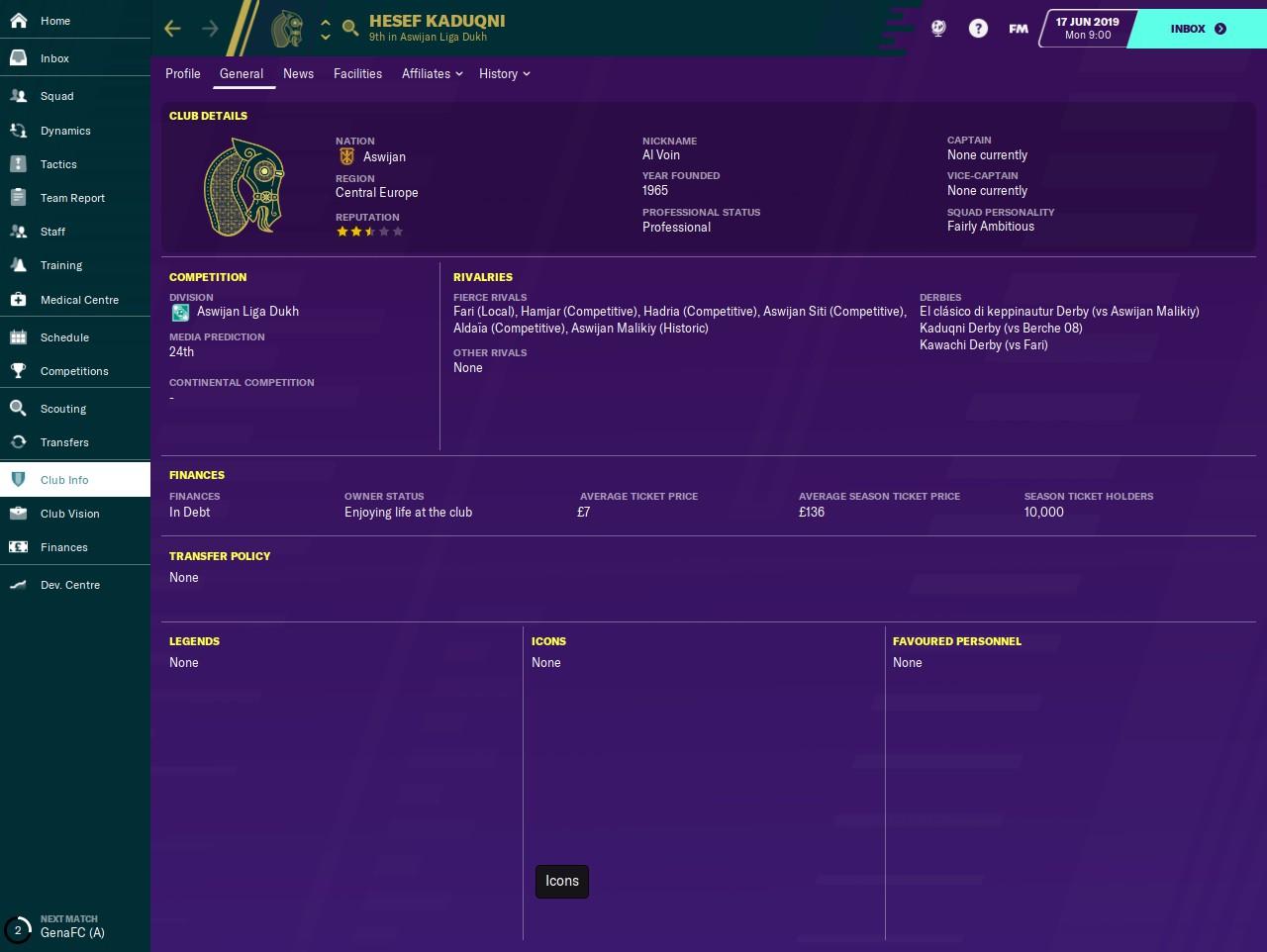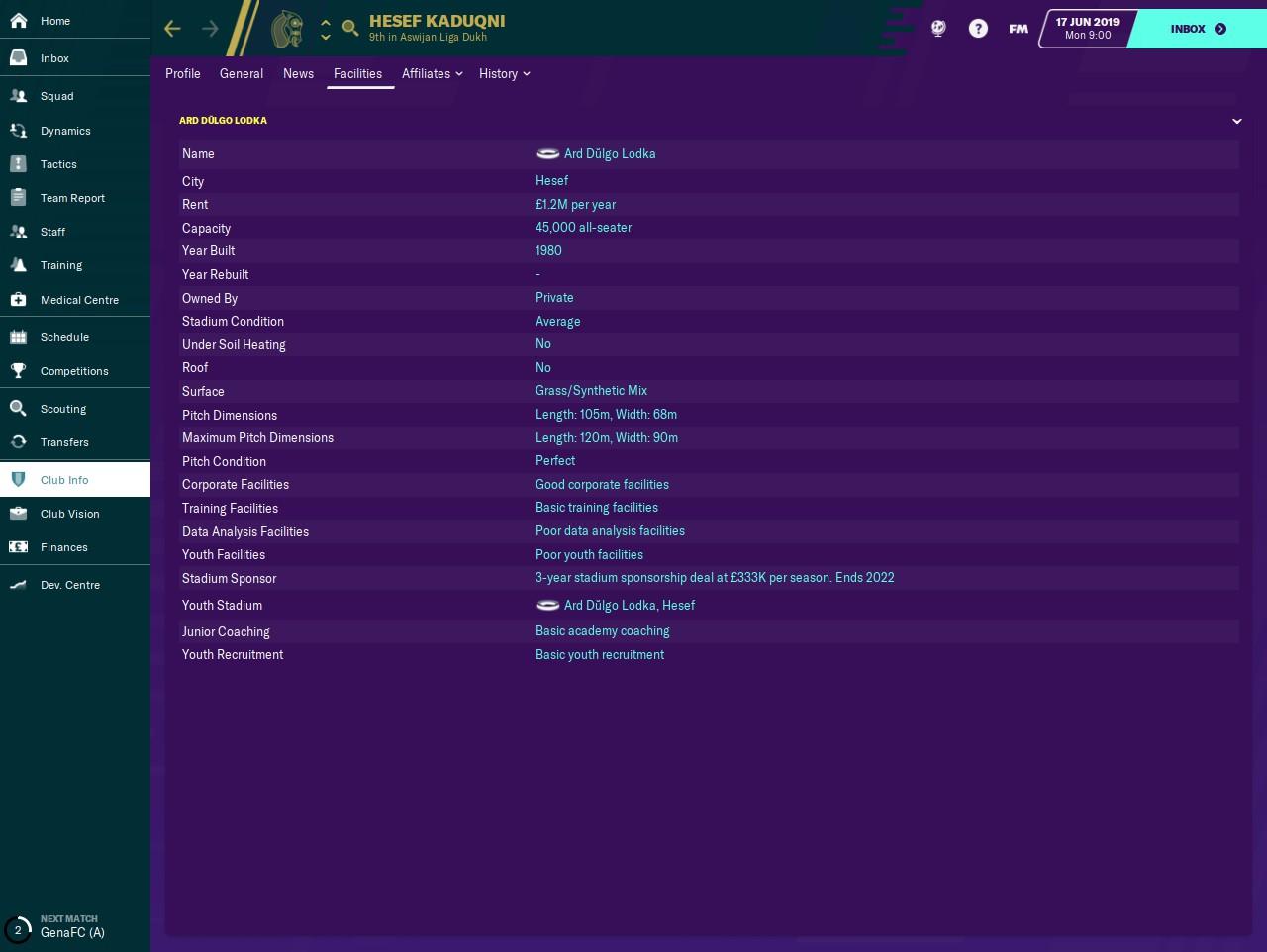
Managing Finances in Football Manager
Rule No.1: Never lose money. Rule No.2: Never forget rule No.1 – Warren Buffett
Introduction
For a casual Football Manager like myself, managing finances has never really been at the forefront of the mind. However I found myself in a tricky situation recently, that required some book balancing and financial acumen.
Old Lady Plays’ last article guide to Aswijan (Part 1) introduced me to the Football Manager “hard mode”. With people looking for that last itch to scratch before the (albeit quiet so far) release of the next game, I dove head first into the wonderful world of Aswijan. Hesef Kuduqni to be more accurate. And my word are they in trouble…

Althought Hesef are a fictional team, their situation and plight is much the same as many a real football club. With many clubs under the financial strain the recent standstill has put on the football world. Wigan and Bury have all been victim to financial shortfalls in recent times. With the former and latter facing administration and liquidation respectively. Coventry currently have no place to call home, ground sharing with Birmingham, some 38 miles away. Clubs at the lower end of football pyramids are more likely to feel financial strains. Fallen giants can also succumb to the Gods of revenue; Leeds United are one of the biggest examples; playing a huge monopoly on Champions League qualification, and ending up relegated and in administration within the space of 30 months.
The club finances
Managing Finances in Football Manager is relatively straightforward, once you get any spiralling costs dealt with. We first need to work out how much debt we are in. The finances tab will show us everything we need; from an overall picture of the debt, down to the smaller details of where main expenditure is, and even how much money you have gained from your code of conduct and club fines.
The income and expenditure views provide a month by month or season by season breakdown of things like sponsorship payments, kit deals, gate receipts, match day revenue, merchandising, transfers, wages and bonuses, travel expenses, and loan repayments. Each of these will have peaks and troughs as the season moves forward. Sponsors and kit deals are finalized in the off season, and pay lower monthlyamounts throughout the season. Player sales can only be done during transfer windows. And wages and bonuses may be paid out on promotion or clauses in contracts. Lastly in the finances section, is the club projection. This provides an approximation of the clubs wages, expenditure, profit or loss, and turnover for the next few years. The aim for managing finances in Football Manager is to get all these figures into positive figures.
Reducing expenditure
Before we can even think of rebuilding the club, we must balance the books. We need to explore the ways of reducing the clubs expenditure. Selling players gives you an immediate cash injection through transfer fees, but will also reduce the wage bill, and could include clauses and future fees to increase revenue further down the line; sell on clauses or monthly installments.
Sometimes it isn’t possible to sell players, be it through their quality or simply no clubs make an offer. In these circumstances it may be worthwhile offering players a mutual termination of a contract, or release them on a free. Be aware however, compensation fees will be incurred, and these are removed from your transfer budget. So clubs in poor financial state (like Hesef) don’t have a transfer budget. for these clubs i would recommend a loan option, with the wages to be paid by the loaning party.

You may be able to talk to your board and suggest decreasing youth funding or coaching. This will be worthwhile for clubs with already poor youth squads, or clubs that do not have youth aspirations in the club vision.

Try to negotiate new contracts with high earning players. Sometimes players may be willing to take a paycut with the promise of increased playing time or future bonuses.
Increase income
The simplest and quickest way of gaining income is to sell players. By selling players you are immediately adding to the clubs income, and as mentioned before, reducing expenditure on wages. Don’t feel the need to offload your entire squad, only players you can afford to lose. If selling your highest valued player means certain relegation, don’t do it, the club will be worse off in the long run. Try targetting high earners and fringe players that won’t feature much in the coming season.
A surefire and steady income year upon year can be an affiliate club. Approach the board to ask them to begin looking for one, and they will present you with a list of suitable clubs to pick from. This affiliate will provide a yearly fee, usually in exchange for a pre season friendly, and can often step in during extremely difficult times to provide further financial help. Affiliate clubs may also be a means to improve your squad, most loan fees are paid by the parent club in these arrangements.
Try signing marquee players from the same nation as your affiliate, this will increase merchandising and shirt sales in that country. Over time, your popularity will grow in that country and it will become another huge income stream to your football club. Manchester United have excelled in the global merchandising market over the last few decades.
Financial summary
Financial stability and managing finances in Football Manager is not an overnight task, nor will you be become a money pit within a season. By paying attention to your finances, income and expenditure, you should be able to grow your club to an initial stable condition. Then onto riches beyond what you thought capable. With more money, comes better players, higher wages, and higher league positions.
When you think you’ve found that financial harmony, stick to it. Work to your means, stick to your budgets. Try keep within your transfer and wage budgets, don’t overstretch on that one signing. In the long term you will be better suited keeping finances in check. Boards are more likely to grant requests if they know you are good with finances. Overspending on the wage budget by 10k a week? Highly unlikely you’re getting that training upgrade.
Or you can always take a leaf out of my book, the one i’ve opened up since taking over at Hesef Kuduqni. I’m starting to think this team are like the Football Manager equivalent of Star Treks Kobayashi Maru test. It’s a no win, and I feel I just need to embrace the cold hug of the administrators…

As always, please feel free to leave comments and questions below, or on our Twitter page here. Alternatively, like our Facebook page here.
Some other articles you may enjoy:
How Crucial are Assistant Managers?
Expected Assists (xA) and Received Passes in FM20
Unsung Heroes: Complete Wing Back





